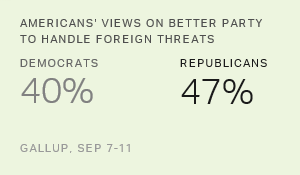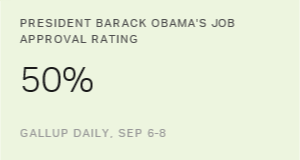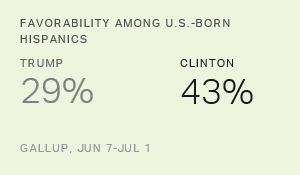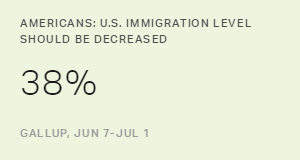Story Highlights
- 47% favor GOP, 40% Democrats on protecting nation
- GOP has slight edge on keeping country prosperous
WASHINGTON, D.C. -- More Americans say the Republican Party will do a better job than the Democratic Party of protecting the country from foreign threats, but the gap between the parties has narrowed in the last year. The Republicans now lead by seven percentage points, 47% to 40%, down from their 16-point lead a year ago (52% to 36%).
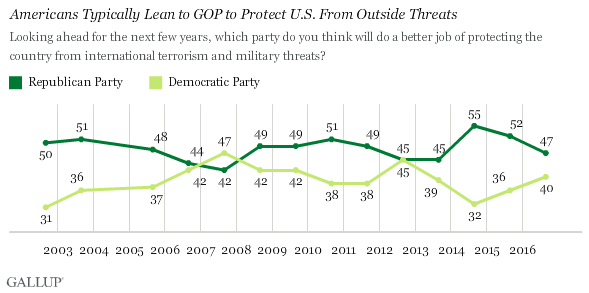
Americans have favored the Republican Party in all but two years since the question was first asked in 2002, though often by less than a majority.
The only time the Democrats were favored was in September 2007, when 47% said the Democrats could do a better job, compared with 42% for the GOP. At that time, most Americans had become pessimistic about the chances of the U.S. winning the Iraq War and were unhappy with Republican President George W. Bush's handling of foreign policy. A year later, however, Republicans once again edged out Democrats on this issue, 49% to 42%, in a poll conducted shortly after the Republican National Convention. The Republican candidate that year was war hero and veteran Sen. John McCain, running against freshman Sen. Barack Obama.
In September 2012, in a poll conducted immediately after Obama was nominated for re-election at the Democratic National Convention, Americans were evenly split (45% for each party) on which party would better defend the nation against foreign threats.
The slide in support for the GOP this year could be tied to the upcoming presidential election. Democratic nominee Hillary Clinton has experience as both a U.S. senator and as secretary of state, while GOP nominee Donald Trump has no direct experience in conducting foreign policy.
GOP Has Slight Lead on Keeping Country Prosperous
Americans, by a narrow 46% to 43% margin, say the Republican Party would do a better job than the Democratic Party of keeping the country prosperous. These views are almost exactly the same as they were a year ago, but are a significant shift from views in the final months of the past two presidential elections, when the Democrats led. In September 2012, 51% said the Democrats would do a better job of keeping the country prosperous, compared with 42% who favored the Republican Party. In September 2008, 52% preferred the Democratic Party, with 39% saying the GOP could do a better job.
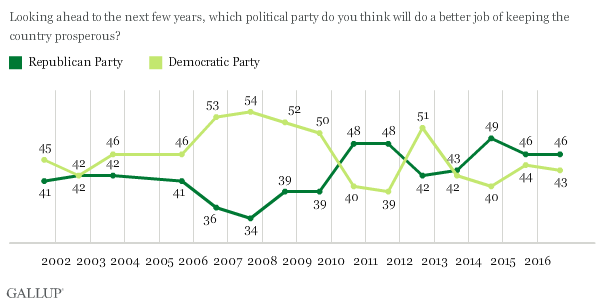
From 2001, when Gallup began routinely asking the question each September, through the eight years of George W. Bush's two terms as president, Americans either were more likely to think Democrats would do a better job of keeping the nation prosperous, or were almost evenly divided on the subject. Since Obama took office in 2009, public opinion has shifted back and forth between the two parties.
Key voting groups have become much less likely to think the Democratic Party will do a better job of keeping the country prosperous since the last presidential election.
-
In 2012, a clear majority of women (58%) said the Democrats would do a better job, with only 38% naming the GOP. Now, women are almost evenly split -- 44% favor the Democratic Party and 43% the Republican Party.
-
Among moderates, the percentage favoring the Democratic Party has dropped from 61% in 2012 to 47% now.
-
Fifty-seven percent of middle-income Americans -- those with annual household incomes between $30,000 and $75,000 -- favored the Democratic Party in 2012. The number has shrunk to 42%.
-
Forty-eight percent of independents in 2012 thought the Democratic Party would do a better job. This year, only 35% feel that way.
GOP Holds Edge When Looking at Both Prosperity and Foreign Threats
Forty-one percent now say the Republican Party would do a better job both of protecting the nation from foreign threats and keeping the country prosperous, compared with 35% saying Democrats would do a better job on both. Few Americans have split opinions, favoring one party on one issue and the other party on the other. Only 4% say the GOP is better on defending the country, but the Democrats on prosperity; only 3% go in the other direction -- choosing Democrats on defense and Republicans on prosperity. The remaining 17% have no opinion on at least one of the questions.
Bottom Line
Public opinion about which of the nation's two major parties does a better job on the economy and national security becomes more complicated in a presidential election year, as Americans' opinions of the parties comingle with their views about the party nominees. The process is even more complex this year when assessing a Republican Party's nominee who challenged much of the GOP establishment in winning the nomination.
Attitudes have clearly changed since Trump first began his race for the presidency in 2015. On the one hand, the percentage of Americans who believe the Republican Party could do a better job of protecting the nation from foreign threats dropped from 55% in 2014, before Trump announced he would run, to 47% now. On the other hand, more Americans still side with the GOP than the Democrats, reflecting the traditional GOP advantage on this issue.
Americans give only a slight edge to the Republicans on "keeping the country prosperous," but that is a considerable improvement for the GOP when compared with attitudes leading up to the last two presidential elections.
These views about the parties could wind up being overwhelmed in the presidential election by voters' views of the candidates themselves. Even if that happens, the more positive views of the Republican Party in this election than in 2012 could pay dividends in the battles for control of Congress.
Survey Methods
Results for this Gallup poll are based on telephone interviews conducted Sept. 7-11, 2016, with a random sample of 1,020 adults, aged 18 and older, living in all 50 U.S. states and the District of Columbia. For results based on the total sample of national adults, the margin of sampling error is ±4 percentage points at the 95% confidence level. All reported margins of sampling error include computed design effects for weighting.
Each sample of national adults includes a minimum quota of 60% cellphone respondents and 40% landline respondents, with additional minimum quotas by time zone within region. Landline and cellular telephone numbers are selected using random-digit-dial methods.
View complete question responses and trends.
Learn more about how the Gallup Poll Social Series works.
